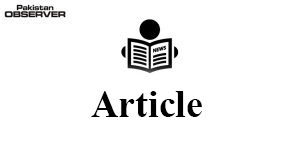Khadija Zafar
FREQUENTLY listened and spoken word is change and is perceived in a positive connotation. Everyone talks about the change and wants to adapt to that change. We are asked from the very start to change our habits, attitudes, routine, mental approach and everything else, regarding everyone and everything with the changing norms. So, what is this change and why we are required to change ourselves, our entire being?
Maybe, we get sick of same routine, rules, values, things and people and that is the reason that we change or sometimes exchange them. But whether it is only change that matters and not kind of change. Before adapting have we ever questioned ourselves that whether it is a right kind of change or not. Does it matter more to change as per norms and direction doesn’t matter.
For instance, a person who lies because doing so is in his advantage as well as majority is over it, will be considered as smart, confident and career oriented. And the one, who don’t manipulate, will be considered as outdated and he is really expected to change himself. People who manipulate, cheat and are involved in obscenity are regarded as smart, efficient and pragmatic because they are following the majority, hence, a part of that majority.
It is a well established fact that majority is authority, therefore, the ones who are otherwise need to change themselves to prevent their exclusion from the general masses. It is also widely known that the direction of change is always directed by the actors in power. The direction of change itself keeps on changing as the authority changes its author. It is pervasive at so many levels. Changing political ideologies ie Capitalism, Communism, Marxism and Socialism during changing geopolitical scenarios are the examples of this phenomenon.
Capitalism was a universal world order having United States of America, an economic and military might as its proponent. Now the world is witnessing a shift towards autocratic tendencies having China, rising economic and technological giant as its proponent. Phenomenon akin to it is evident in human behaviours. In any society and culture, always a weaker segment is expected to change and adopt the ways of other segment.
Previously, the popularity of western culture and recently, Korean and Chinese emerging trends are obvious. Several politicians have taken the advantage of this terms’ fantasy from which the most quoted instance is Russian Revolution. Changing times might also exchange this example with the Imran Khan’s mantra of change. So far, situation is shrieking that direction of change has overturned. Keeping all the facts straight, we can infer that change is actually the submission of a weak to the will of his authorities.
—The writer is freelance columnist, based in Islamabad.










